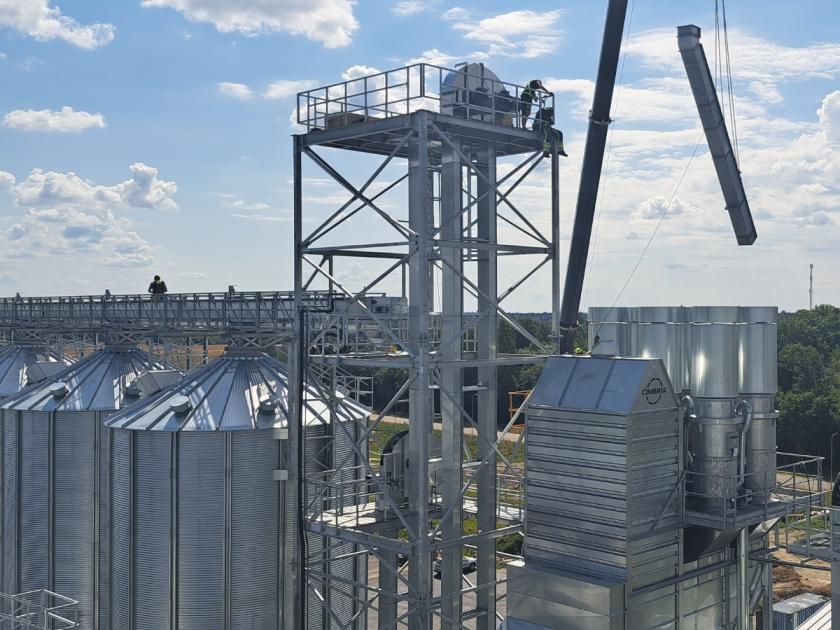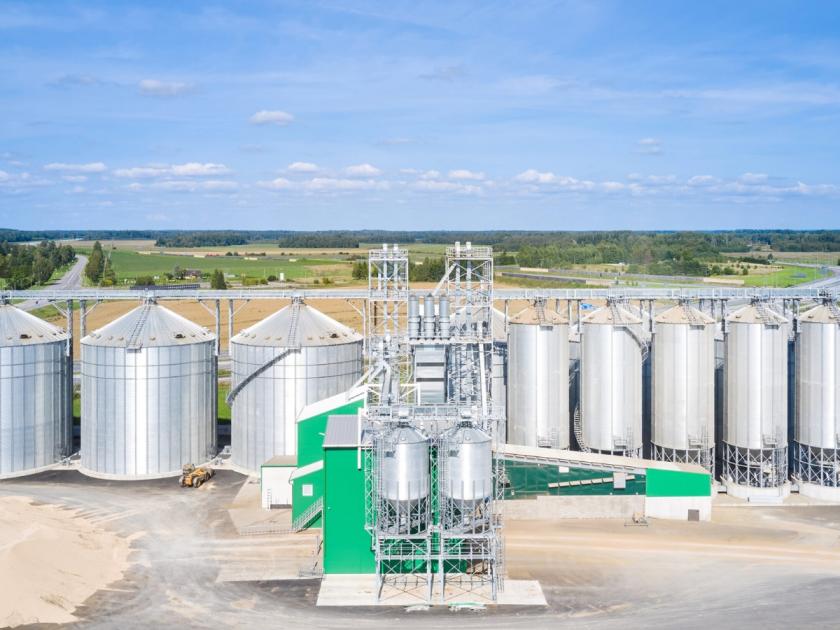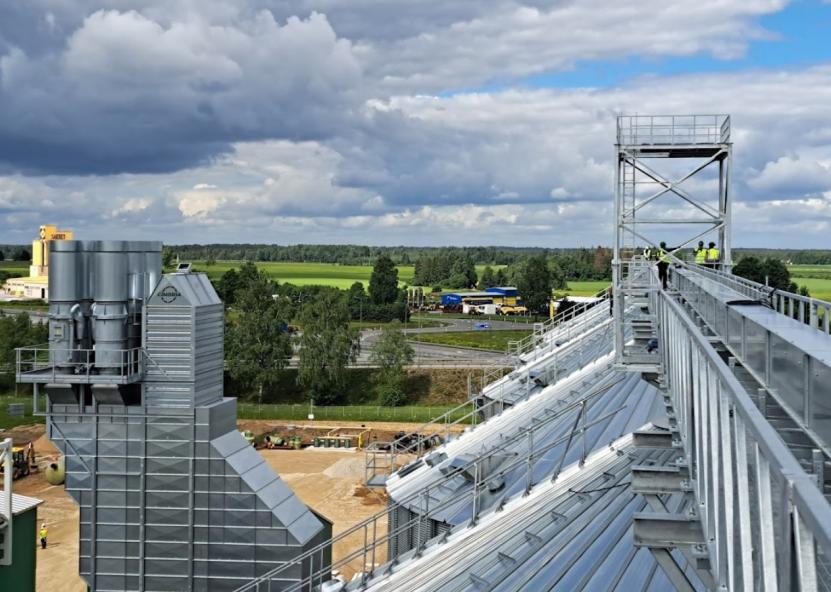KEVILI Mäo, one of the largest grain terminals in Estonia
In August 2024, a major grain terminal was completed in Estonia, owned by the farmer cooperative KEVILI. The cooperative has increased its storage capacity to 200,000 tonnes and will also provide a drying service for peas and beans, which is very popular in Estonia. One of the largest grain terminals in Estonia was built by a team of 5 companies, including AS „Dotnuva Baltic“, which played a key role in the design, planning and implementation of the terminal.
The investment in the KEVILI Mä Terminal amounted to almost EUR 14 million. The modern grain terminal stores, dries and processes large volumes of cereals and pulses. The terminal is planned to be able to dry 30 000 tonnes of wet grain and process 100 000 tonnes of dry grain per year. As logistics in Estonia are overloaded at harvest time, the new grain handling facility in the region „Mäo“ will ensure a faster service for grain growers in Central and Western Estonia“," says Hannes Prits, Manager of the KEVILI cooperative.The planning of the terminal started in 2022.According to the KEVILI CEO, the core of the grain elevator is the capabilities and equipment of the process line. "We wanted to invest in reliable solutions, so AS „Dotnuva Baltic“ was chosen among the project partners because of its professionalism and the technologies and equipment offered," says Pritsas.

„Together with the main contractors of the terminal construction, „Mapri Ehitus OÜ“, we have been working together already at the design stage to ensure that the facility is maximally adapted to KEVILI's needs, and then, once the implementation has started, – we have efficiently solved the challenges that have arisen, “, - says Argo Luide, Project Sales Manager of AS „Dotnuva Baltic“.
When the construction of the grain terminal started in October 2023, the high water table made it difficult to construct the foundations, especially as the foundations and channels had to be installed at a depth of 7 metres. The solution to this problem put the project several months behind schedule, further reducing the time needed to complete the project. Despite the month-long delay, thanks to the excellent project management of „Dotnuva Baltic“, well-planned activities and good cooperation with „Mapri Construction“, we managed to complete the project on time, without compromising the quality of the work. The company „Dotnuva Baltic“ worked extremely efficiently and with its dedication ensured that the construction of the complex started and was completed smoothly," says Pritsas.
The grain terminal is equipped with state-of-the-art Cimbria RM10 scraper conveyors, EE14 bucket elevators and an AMG26 flow dryer. The equipment is designed to handle large volumes of grain: the conveyors and elevators have a capacity of 260 tonnes per hour. „This capacity is particularly important for KEVILI's operations during the harvesting season. The technology has been designed to be as flexible as possible, giving operators more options to work with a wide range of grains," says Luide, describing the range of equipment.„KEVILI Mäo“ terminal is designed for a wide range of grains including wheat, barley, oats, peas and oilseed rape. Different types of grain arrive, so the system has to sort, dry and store them separately. A solution has been developed that includes two dryers that allow different types of grain to be processed simultaneously, making the process much more efficient.

The implementation of the KEVILI Mäo“ terminal required more than 300 tonnes of steel structures, 40 kilometres of electrical cables and a total installed electrical capacity of 900 kW. Dotnuva Baltic led the installation process, with the help of 30 assembly team members and electricians. The installation was handled by „Dotnuva Baltic“'s long-standing partner „Ofi Construction OÜ“, whose dedication and experience helped to ensure that the project was completed on schedule.
Thanks to the close cooperation between KEVILI, „Dotnuva Baltic“ and the other partners, the terminal has achieved its objectives and set new high standards for the performance of such projects in Estonia. The fact that the terminal was able to process 62,000 tonnes of grain in the first season (22,000 tonnes of wet grain to be dried and 40,000 tonnes of dry grain) is a testament to the success of the partnership. The installed equipment was also successful in drying peas, which accounted for almost half of the total grain dried.Throughout the project, high quality standards were ensured at every stage, from system design to installation and technical support. Collaboration in design, the ability to overcome challenges and the commitment to quality of „Dotnuva Baltic“ and other partners were undoubtedly key factors in the success of the project. The terminal is now fully operational and provides KEVILI cooperative members with the necessary infrastructure for efficient storage, drying and processing of grain.
About KEVILI Cooperative. KEVILI is an Estonian cereal and rapeseed growers' cooperative, established in 2005, with 100% Estonian ownership and 182 agricultural holdings. The cooperative's members own almost 87 000 hectares of arable land in Estonia. KEVILI reaches the world market with about a quarter of the grain and rapeseed produced in Estonia.
KEVILI, which exports surplus grain for domestic consumption in Estonia, operates the Roodevälja terminal in Lääne-Viru county, the Rõngu terminal in Tartu county, and now also the Mäo terminal in Järva county. The third grain terminal is the result of the rapid growth of KEVILI's membership and its good location in relation to the ports.
From Estonia, grain is exported all over the world. In recent years, wheat has been sold mainly to Africa - Nigeria, Burkina Faso, Chad, etc., while barley has been sold to Spain and Portugal, and peas mainly to Norway.
With the completion of the Mäo terminal, KEVILI's storage capacity in domestic terminals has increased to 200 000 tonnes. Together with the Sillamäe and Muuga port warehouses, the total storage capacity for cereals, pulses and rapeseed will reach 300,000 tonnes.








































































































